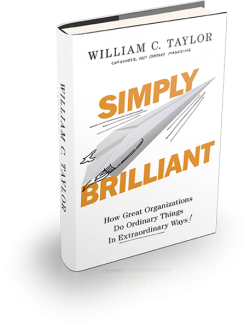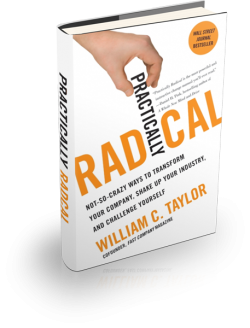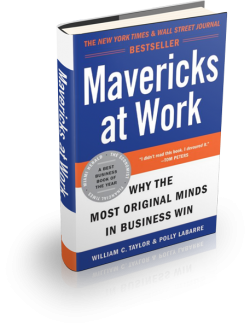I don’t often start essays about leadership with insights from French novelists, but in this case it seems appropriate. “The real act of discovery,” Marcel Proust wrote, “consists not in finding new lands but in seeing with new eyes.” Today the most successful companies don’t just outcompete their rivals. They redefine the terms of competition by embracing one-of-a-kind ideas in a world of copycat thinking. Which means, almost by definition, that the best leaders see things that other leaders don’t see.
HBR: What Breaking the 4-Minute Mile Taught Us About the Limits of Conventional Thinking
The sad news of the passing of Roger Bannister, the first human being to run a four-minute mile, got me thinking about his legacy—not just as one of the great athletes of the past century, but as an innovator, a change agent, and an icon of success. As it turns out, when he broke through a previously impenetrable track-and-field barrier, he taught all of us what it takes to break new ground.
HBR: The Right and Wrong Way to Attract Young Workers to a “Boring” Company
I spend much of my time with senior executives from organizations in, shall we say, not the most glamorous fields: community banks, electrical distributors, heartland manufacturers, and, perhaps least glamorous of all, insurance companies. These executives are rightly proud of what their organizations do, and they can get people like me excited about their plans for growth and change. But they have one huge problem that literally keeps them up at night: Young people find their companies dull and don’t have much enthusiasm for a career in their field. I hear it time and again — How can we compete with Facebook or Google for young engineers? How can we attract digitally savvy marketers against Starbucks or Amazon?
HBR: Companies That Do Right by Their Workers Start by Elevating Their Definition of Success
A sound economy, a booming stock market, and huge business tax cuts, the story goes, have convinced CEOs of companies flush with cash to distribute some of it to frontline employees.
That story is fine as far as it goes — but does it go nearly far enough? With unemployment at record lows, yet inequality at record highs, this feels like a time for CEOs to think bigger — not just to raise wages, but to elevate their definition of success about how their companies can win big in the marketplace and afford employees a greater sense of security and participation in the workplace, how they can generate wealth and share that wealth with everyone who has a hand in its creation.
HBR: The 4 Kinds of Leaders Who Create the Future
Alan Kay, the educator and computer designer, famously declared, “The best way to predict the future is to invent it.” But what does it take to invent the future in such a turbulent and uncertain world? How do successful organizations build on their history, even as they craft a new point of view about what comes next? How do established brands stay true to their original promise, while also making themselves relevant to new customers with different values and preferences? How can accomplished executives be sure that all they know — their hard-earned wisdom and expertise — doesn’t limit what they can imagine?
HBR: How Coca-Cola, Netflix, and Amazon Learn from Failure
I can’t tell you how many business leaders I meet, how many organizations I visit, that espouse the virtues of innovation and creativity. Yet so many of these same leaders and organizations live in fear of mistakes, missteps, and disappointments — which is why they have so little innovation and creativity. If you’re not prepared to fail, you’re not prepared to learn. And unless people and organizations manage to keep learning as fast as the world is changing, they’ll never keep growing and evolving. So what’s the right way to be wrong?
HBR: Amazon, Whole Foods, and the Future of the (Old) New Economy
I heard the news today, oh boy — Amazon is buying Whole Foods Market in a deal worth nearly $14 billion. The combination of these iconic companies, both of which have come of age in the last two decades, raises obvious questions. Does the transaction reflect how hard it’s been for Whole Foods to keep Wall Street satisfied with its growth and profits? (It does.) Does the deal underscore just how expansive a vision Jeff Bezos has for Amazon, his dream of it becoming the “everything store”? (No doubt.)
HBR: 5 Questions to Ask About Corporate Culture to Get Beyond the Usual Meaningless Blather
There aren’t many leaders who would disagree with the idea that a healthy, productive culture is a defining element of business success. Yet I’ve seen so many companies with lofty-sounding “mission statements” and “core values” that have the most toxic workplaces imaginable. I’ve met so many leaders who are brilliant when it comes to product design and capital structure but who treat the people in business as an afterthought, a matter of sound administration as opposed to daring innovation.
Fortune: Where Was the Pilot On That United Airlines Flight?
I’m as horrified as everyone else watching that video of a United Airlines passenger being forcibly dragged from his seat, knocked down and bloodied, to make room for a crew member. I’m also stunned, as someone who studies strategy, culture, and customer service, at what an epic failure this whole episode was, and continues to be. Industry experts have criticized outdated overbooking strategies. Policy experts have criticized laws and regulations that make such evictions legal. Everyone has criticized the public-relations response.


